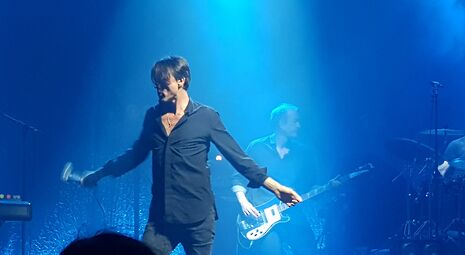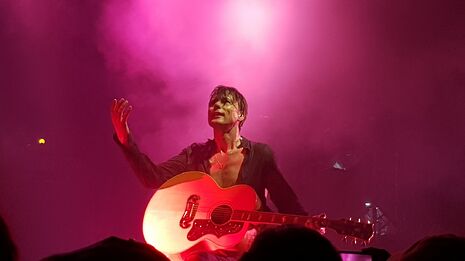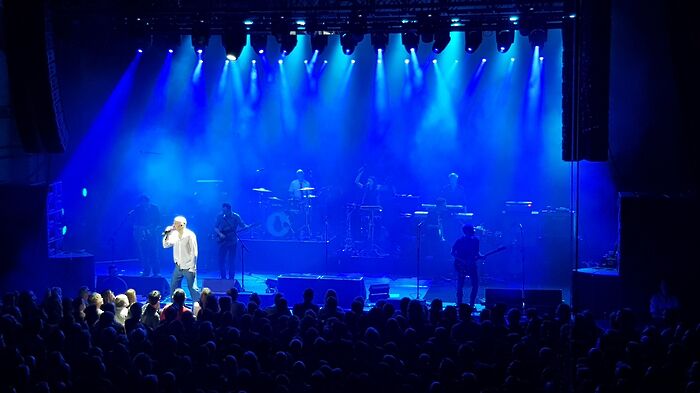Suede at the Corn Exchange: “once again Britain’s best band”
Stopping in Cambridge for the last date of their UK tour, Suede have it all: startling new songs, banging old ones, an incredible dynamism and one heck of a frontman

Brett Anderson’s an attractive man, no doubt. I do question just how much I consider that objectively – having found myself at the centre of a swelling mass of hands pawing at his fraying black shirt. In my (and the frankly frightening fan club’s) defence, the shirt appeared to be constructed with the sole purpose of coming apart. Anderson seemed barely to notice as his glistening back was exposed.
Anderson gives it everything: writhing on the floor, storming through the crowd, lassoing himself with the mic
Where my infatuation with Suede’s frontman becomes largely more refined – or more obsessive, depending on your perspective – is that he comes across as strikingly intelligent (his recent autobiography Coal Black Mornings is a fine read) and passionate, and really everything a bona fide rock star now in middle age should be. Even looking back at their histrionic explosion onto the scene in the early 90s, you can almost detect how the band's identity was not antithetical to the idea of aging, a kind of seedy aloofness acting as a perverse form of dignity. They were just kids really, but behaving as if they had slummed it in every filthy den imaginable. Acting beyond your years is quite helpful when you finally do reach those years.
The show at the Corn Exchange was a tribute to just how tastefully Suede have aged, with no immediate sense of jarring between saucy old ones and gloomy new ones. It all began with a certain air of understatement, as the band’s silhouettes shifted in and out of focus to the menace of ‘As One’, the opener from last year’s The Blue Hour, their third effort since returning in 2013. With that album, Suede produced a genuinely modern gothic to rival their 1994 magnum opus Dog Man Star, trading the sordid claustrophobia of the city for the nocturnal stirrings of suburbia.

On first listen, The Blue Hour seemed a little too much. It didn’t help when the press release hailed it as a “genuinely progressive, expansive and definitive body of work”. It took just a bit of time to realise that its lushness, its intensity, its morbid spoken-word interludes – these were all part of a wonderfully ambiguous narrative weaved over some of Suede’s best songs.
It would be too neat to suggest that this crude opposition between the old and new defined the evening. It wasn’t all ‘Animal Nitrate’ (“Oh in your council home he jumped on your bones/Now you're taking it time after time”) versus ‘The Invisibles’ (“I hear the wood pigeons and I call my father in”) – most everything in-between reared its head too. Personal highlights included the twisted, galvanised groove of ‘Can’t Get Enough’ from 1999’s unjustly maligned Head Music, and the handsomely titled B-side ‘Europe Is Our Playground’.
Certainly holding it all together is that no matter when the song was written, Anderson gives it everything: writhing on the floor, storming through the crowd, lassoing himself with the mic. Perhaps the most affecting moment of the gig was when he, having admitted to being under heavy vocal strain, still refused to let the crowd do too much of the work on a solo rendition of ‘The Wild Ones’. In a gesture of pleasing defiance, he threw his head back to the ceiling with a wide grin as he belted out, “We’ll shine in the morning and sin in the sun.”
Set closer ‘Flytipping’, the final track from The Blue Hour, is a staggering reminder of just how well Suede play together as a band. It is all very well for me to go on about Brett Anderson (and he is a truly wondrous specimen), but ‘Flytipping’ is all about timing, space, and feeling, spearheaded by Richard Oakes’ measured waves of spare guitar lines. Thirty years into their career, and six years into a hugely rewarding comeback, Suede are once again Britain’s best band.
 News / Eight Cambridge researchers awarded €17m in ERC research grants27 December 2025
News / Eight Cambridge researchers awarded €17m in ERC research grants27 December 2025 News / Clare Hall spent over £500k opposing busway 24 December 2025
News / Clare Hall spent over £500k opposing busway 24 December 2025 Comment / League tables do more harm than good26 December 2025
Comment / League tables do more harm than good26 December 2025 News / Caius mourns its tree-mendous loss23 December 2025
News / Caius mourns its tree-mendous loss23 December 2025 Comment / The ‘class’ of Cambridge24 December 2025
Comment / The ‘class’ of Cambridge24 December 2025










